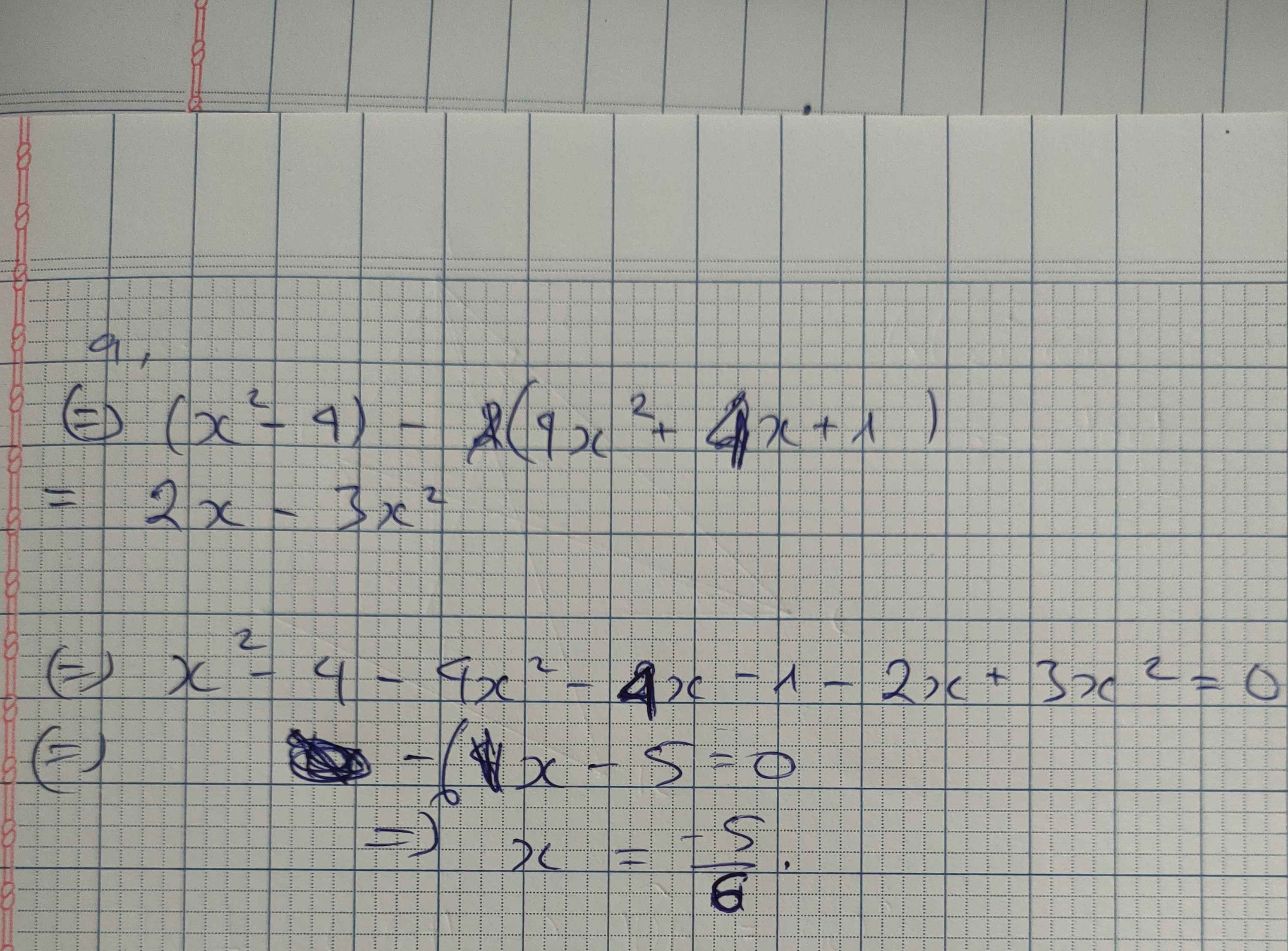Hãy nhập câu hỏi của bạn vào đây, nếu là tài khoản VIP, bạn sẽ được ưu tiên trả lời.

a: \(\Leftrightarrow x^2-4-4x^2-4x-1-2x+3x^2=0\)
=>-6x-5=0
=>-6x=5
hay x=-5/6
b: \(\Leftrightarrow2x^3+8x^2+8x-8x^2-2x^3+16=0\)
=>8x+16=0
hay x=-2
c: \(\Leftrightarrow x^3-6x^2+12x-8+9x^2-1-x^3-3x^2-3x-1=0\)
=>9x-10=0
hay x=10/9
d: \(\Leftrightarrow10x-15-20x+28=19-2x^2-4x-2\)
\(\Leftrightarrow-10x+13+2x^2+4x-17=0\)
\(\Leftrightarrow2x^2-6x-4=0\)
\(\Leftrightarrow x^2-3x-2=0\)
\(\text{Δ}=\left(-3\right)^2-4\cdot1\cdot\left(-2\right)=9+8=17>0\)
Do đó: Phương trình có hai nghiệm phân biệt là:
\(\left\{{}\begin{matrix}x_1=\dfrac{3-\sqrt{17}}{2}\\x_2=\dfrac{3+\sqrt{17}}{2}\end{matrix}\right.\)

b: =>1/4x+4/5-x-5=1/3x+1-1/2x+1
=>-3/4x+1/6x=2+5-4/5=24/5
=>x=-288/35
c: =>6x^2+3x-30x-15=6x^2+10x-21x-35
=>-27x-15=-11x-35
=>-16x=-20
=>x=5/4

Bài 1:
a.
$(4x^2+4x+1)-x^2=0$
$\Leftrightarrow (2x+1)^2-x^2=0$
$\Leftrightarrow (2x+1-x)(2x+1+x)=0$
$\Leftrightarrow (x+1)(3x+1)=0$
$\Rightarrow x+1=0$ hoặc $3x+1=0$
$\Rightarrow x=-1$ hoặc $x=-\frac{1}{3}$
b.
$x^2-2x+1=4$
$\Leftrightarrow (x-1)^2=2^2$
$\Leftrightarrow (x-1)^2-2^2=0$
$\Leftrightarrow (x-1-2)(x-1+2)=0$
$\Leftrightarrow (x-3)(x+1)=0$
$\Leftrightarrow x-3=0$ hoặc $x+1=0$
$\Leftrightarrow x=3$ hoặc $x=-1$
c.
$x^2-5x+6=0$
$\Leftrightarrow (x^2-2x)-(3x-6)=0$
$\Leftrightarrow x(x-2)-3(x-2)=0$
$\Leftrightarrow (x-2)(x-3)=0$
$\Leftrightarrow x-2=0$ hoặc $x-3=0$
$\Leftrightarrow x=2$ hoặc $x=3$
2c.
ĐKXĐ: $x\neq 0$
PT $\Leftrightarrow x-\frac{6}{x}=x+\frac{3}{2}$
$\Leftrightarrow -\frac{6}{x}=\frac{3}{2}$
$\Leftrightarrow x=-4$ (tm)
2d.
ĐKXĐ: $x\neq 2$
PT $\Leftrightarrow \frac{1+3(x-2)}{x-2}=\frac{3-x}{x-2}$
$\Leftrightarrow \frac{3x-5}{x-2}=\frac{3-x}{x-2}$
$\Rightarrow 3x-5=3-x$
$\Leftrightarrow 4x=8$
$\Leftrightarrow x=2$ (không tm)
Vậy pt vô nghiệm.

\(a,\dfrac{3}{2x-1}+1=\dfrac{2x-1}{2x+1};ĐKXĐ:x\ne\pm\dfrac{1}{2}\\ \Leftrightarrow\dfrac{3}{2x-1}-\dfrac{2x-1}{2x+1}+1=0\\ \Leftrightarrow\dfrac{3\left(2x+1\right)}{\left(2x-1\right)\left(2x+1\right)}-\dfrac{\left(2x-1\right)\left(2x-1\right)}{\left(2x+1\right)\left(2x-1\right)}+\dfrac{\left(2x-1\right)\left(2x+1\right)}{\left(2x-1\right)\left(2x+1\right)}=0\\ \Rightarrow3\left(2x+1\right)-\left(2x-1\right)^2+\left(2x-1\right)\left(2x+1\right)=0\\ \Leftrightarrow6x+3-\left(4x^2-4x+1\right)+\left(4x^2-1\right)=0\\ \Leftrightarrow6x+3-4x^2+4x-1+4x^2-1=0\\ \Leftrightarrow10x+1=0\\ \Leftrightarrow10x=-1\\ \Leftrightarrow x=-\dfrac{1}{10}\)
Vậy \(x\in\left\{-\dfrac{1}{10}\right\}\)

a) Ta có: \(\left(2x-3\right)^2=\left(2x-3\right)\left(x+1\right)\)
\(\Leftrightarrow\left(2x-3\right)^2-\left(2x-3\right)\left(x+1\right)=0\)
\(\Leftrightarrow\left(2x-3\right)\left(2x-3-x-1\right)=0\)
\(\Leftrightarrow\left(2x-3\right)\left(x-4\right)=0\)
\(\Leftrightarrow\left[{}\begin{matrix}2x-3=0\\x-4=0\end{matrix}\right.\Leftrightarrow\left[{}\begin{matrix}2x=3\\x=4\end{matrix}\right.\Leftrightarrow\left[{}\begin{matrix}x=\dfrac{3}{2}\\x=4\end{matrix}\right.\)
Vậy: \(S=\left\{\dfrac{3}{2};4\right\}\)
b) Ta có: \(x\left(2x-9\right)=3x\left(x-5\right)\)
\(\Leftrightarrow x\left(2x-9\right)-3x\left(x-5\right)=0\)
\(\Leftrightarrow x\left(2x-9\right)-x\left(3x-15\right)=0\)
\(\Leftrightarrow x\left(2x-9-3x+15\right)=0\)
\(\Leftrightarrow x\left(6-x\right)=0\)
\(\Leftrightarrow\left[{}\begin{matrix}x=0\\6-x=0\end{matrix}\right.\Leftrightarrow\left[{}\begin{matrix}x=0\\x=6\end{matrix}\right.\)
Vậy: S={0;6}
c) Ta có: \(3x-15=2x\left(x-5\right)\)
\(\Leftrightarrow3\left(x-5\right)-2x\left(x-5\right)=0\)
\(\Leftrightarrow\left(x-5\right)\left(3-2x\right)=0\)
\(\Leftrightarrow\left[{}\begin{matrix}x-5=0\\3-2x=0\end{matrix}\right.\Leftrightarrow\left[{}\begin{matrix}x=5\\2x=3\end{matrix}\right.\Leftrightarrow\left[{}\begin{matrix}x=5\\x=\dfrac{3}{2}\end{matrix}\right.\)
Vậy: \(S=\left\{5;\dfrac{3}{2}\right\}\)
d) Ta có: \(\dfrac{5-x}{2}=\dfrac{3x-4}{6}\)
\(\Leftrightarrow6\left(5-x\right)=2\left(3x-4\right)\)
\(\Leftrightarrow30-6x=6x-8\)
\(\Leftrightarrow30-6x-6x+8=0\)
\(\Leftrightarrow-12x+38=0\)
\(\Leftrightarrow-12x=-38\)
\(\Leftrightarrow x=\dfrac{19}{6}\)
Vậy: \(S=\left\{\dfrac{19}{6}\right\}\)
e) Ta có: \(\dfrac{3x+2}{2}-\dfrac{3x+1}{6}=2x+\dfrac{5}{3}\)
\(\Leftrightarrow\dfrac{3\left(3x+2\right)}{6}-\dfrac{3x+1}{6}=\dfrac{12x}{6}+\dfrac{10}{6}\)
\(\Leftrightarrow6x+4-3x-1=12x+10\)
\(\Leftrightarrow3x+3-12x-10=0\)
\(\Leftrightarrow-9x-7=0\)
\(\Leftrightarrow-9x=7\)
\(\Leftrightarrow x=-\dfrac{7}{9}\)
Vậy: \(S=\left\{-\dfrac{7}{9}\right\}\)

b: \(\Leftrightarrow\dfrac{-3x^2+36x+12}{3\left(x+4\right)\left(x-1\right)}=\dfrac{36\left(x-1\right)}{3\left(x+4\right)\left(x-1\right)}+\dfrac{12\left(x+4\right)}{3\left(x-1\right)\left(x+4\right)}\)
\(\Leftrightarrow-3x^2+36x+12=36x-36+12x+48\)
\(\Leftrightarrow-3x^2+36x+12-48x-12=0\)
\(\Leftrightarrow3x\left(x+4\right)=0\)
=>x=0(nhận) hoặc x=-4(loại)

\(a,\left(2x-3\right)^2=\left(x+1\right)^2\\ \Leftrightarrow\left(2x-3\right)^2-\left(x+1\right)^2=0\\ \Leftrightarrow\left(2x-3+x+1\right)\left(2x-3-x-1\right)=0\\ \Leftrightarrow\left(3x-2\right)\left(x-4\right)\\ \Leftrightarrow\left[{}\begin{matrix}3x-2=0\\x-4=0\end{matrix}\right.\\ \Leftrightarrow\left[{}\begin{matrix}3x=2\\x=4\end{matrix}\right. \\ \Leftrightarrow\left[{}\begin{matrix}x=\dfrac{2}{3}\\x=4\end{matrix}\right.\)
Vậy \(x\in\left\{\dfrac{2}{3};4\right\}\)
\(b,x^2-6x+9=9\left(x-1\right)^2\\ \Leftrightarrow\left(x-3\right)^2=9\left(x-1\right)^2\\ \Leftrightarrow\left(x-3\right)^2-9\left(x-1\right)^2=0\\ \Leftrightarrow\left(x-3\right)^2-3^2\left(x-1\right)^2=0\\ \Leftrightarrow\left(x-3\right)^2-\left[3\left(x-1\right)\right]^2=0\\ \Leftrightarrow\left(x-3\right)^2-\left(3x-3\right)^2=0\\ \Leftrightarrow\left(x-3+3x-3\right)\left(x-3-3x+3\right)=0\\ \Leftrightarrow-2x\left(4x-6\right)=0\\ \Leftrightarrow\left[{}\begin{matrix}-2x=0\\4x-6=0\end{matrix}\right.\\ \Leftrightarrow\left[{}\begin{matrix}x=0\\4x=6\end{matrix}\right.\\ \Leftrightarrow\left[{}\begin{matrix}x=0\\x=\dfrac{3}{2}\end{matrix}\right.\)
Vậy \(x\in\left\{0;\dfrac{3}{2}\right\}\)


a) \(\left(x-2\right)^2=\left(x-4\right)\left(x+4\right)\)
\(\Leftrightarrow x^2-4x+4-x^2+16=0\)
\(\Leftrightarrow20-4x=0\)
\(\Leftrightarrow4x=20\)
\(\Leftrightarrow x=5\)
Vậy S = {5}
b) ĐKXĐ: \(x\ne0;x\ne-2\)
\(\dfrac{x+2}{x}=\dfrac{\left(x+1\right)\left(x+4\right)}{x^2+2x}+\dfrac{x}{x+2}\)
\(\Leftrightarrow\dfrac{x+2}{x}=\dfrac{x^2+4x+x+4+x^2}{x\left(x+2\right)}\)
\(\Leftrightarrow\dfrac{x+2}{x}=\dfrac{2x^2+5x+4}{x\left(x+2\right)}\)
\(\Rightarrow x\left(x+2\right)^2=x\left(2x^2+5x+4\right)\)
\(\Leftrightarrow x^3+4x^2+4x=2x^3+5x^2+4x\)
\(\Leftrightarrow x^3+x^2=0\)
\(\Leftrightarrow x^2\left(x+1\right)=0\)
\(\Leftrightarrow\left[{}\begin{matrix}x^2=0\\x+1=0\end{matrix}\right.\) \(\Leftrightarrow\left[{}\begin{matrix}x=0\left(loại\right)\\x=-1\left(TM\right)\end{matrix}\right.\)
Vậy S = {-1}
c) Câu này mình không chắc về đề lắm! Bạn dùng ô chữ M bị ngược để viết lại đề nhé!
a) Ta có: \(\left(x-2\right)^2=\left(x-4\right)\left(x+4\right)\)
\(\Leftrightarrow x^2-4x+4=x^2-16\)
\(\Leftrightarrow x^2-4x+4-x^2+16=0\)
\(\Leftrightarrow-4x+20=0\)
\(\Leftrightarrow-4x=-20\)
hay x=5
Vậy: S={5}